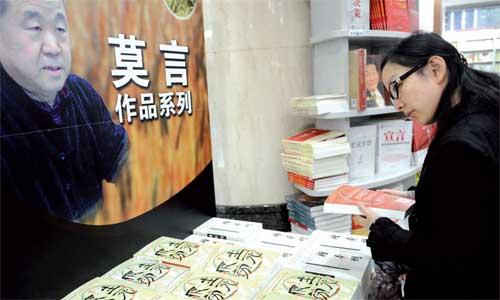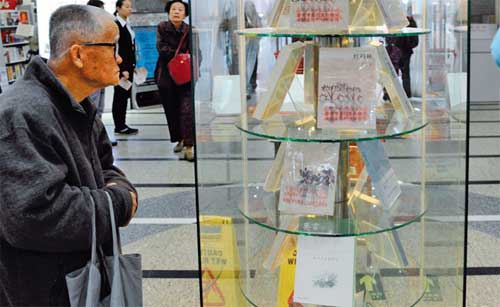Mo money

Stephen Guo, a 36-year-old salesman in Beijing, logged onto dangdang.com early on October 12, the day after Chinese writer Mo Yan won the 2012 Nobel Prize for Literature. He was hoping to buy two of Mo's novels, Frog and Big Breasts and Wide Hips, but found that nearly all of Mo's works had sold out.
Dangdang is China's largest online bookstore. Without getting what he wanted on the website, Guo turned to other major online bookstores such as amazon.cn and found the same.
He waited for three days until some of Mo's books became available for ordering on dangdang.com, but the prices had shot up by more than 20 percent.
The 57-year-old Mo became the first Chinese citizen to win the Nobel Prize for Literature. He rose to fame in 1987 when his book Red Sorghum: A Novel of China was made into a film by famous Chinese director Zhang Yimou.
Mo also won the Mao Dun Literature Prize, China's most prestigious literary award, last year for his latest novel Frog.
In the week prior to the announcement of this year's Nobel Prize, speculation was rife that Mo might pick up the prize.
"Sales of Mo's book increased six or seven times before he was actually awarded the prize, and they have soared by 10 times now," said Wang Fan, a staff member in charge of public relations at dangdang.com.
Offline bookstores have also seen a surge in demand for Mo's books. On October 15, in Beijing Books Building, the country's largest State-owned bookstore, readers queued up to buy Mo's books.
A sales assistant told the Global Times that all of Mo's books sold out over the weekend and delivery of more stock may arrive by the end of the week at the earliest.
"Every 10 minutes a customer would come to ask about Mo's books and my lips were almost numb answering all the inquiries," she said.
Publishing boost
The jump in sales for Mo's books has brought a much-needed boost for the currently sluggish paper-based publishing industry. Publishers are now busy reprinting Mo's books to meet the demand.
"All the old versions of Mo's books sold out before October 11 and a total of 200,000 sets of Mo's 16 collected works are now being printed," said Cao Yuanyong, deputy editor of Shanghai Literature and Art Publishing House.
The company owns the publishing rights to 16 of Mo's books, including 11 of his long novels and five medium- and short-length novels, almost covering all of his works.
The covers of Mo's books have been replaced with new ones, labeling him as the winner of the 2012 Nobel Prize for Literature, Cao said.
Orders for the new print run of Mo's collected works reached 100,000 sets within three days after Mo won the prize, he said.
One set of the 16 books costs around 600 yuan ($96), so sales of Mo's books were expected to bring the publishing house 60 million yuan in revenue in three days.
But the biggest beneficiary is probably Beijing Genuine & Profound Culture Development Co, which has also obtained the publishing rights to Mo's works, including his published novels, prose and other works not yet published as well as e-publishing rights. It will also receive income from any movie and television shows adapted from Mo's works.
"The company signed a contract with Mo about six months ago to publish his works and will soon publish a complete collection of Mo's works including 20 of his books, with an average price for each book of 30 yuan," said Mao Sheng, a manager in charge of the company's copyright department.
The company will also publish a new novel by Mo and is expecting to sell between 500,000 and 1 million copies.
"Mo's award enhances our popularity and will speed up the company's process of getting listed," he said.
"Mo's Nobel prize could drive the development of the country's fledgling culture and media industry, including film and television as well as the advertising industry," said Cai Ling, an analyst with Shenzhen-based CIC industry research center.
Many film investors have contacted the company to discuss the possibility of bringing Mo's works to the big screen, and telecom and Internet operators have expressed their desire to buy the e-publishing rights for Mo's works, said Mao from Beijing Genuine & Profound Culture Development Co.

Mo Yan fever
Mo's Nobel prize triggered a chain reaction, with various businesses and individuals rushing to cash in.
In Gaomi, East China's Shandong Province, Mo's hometown, local tourism authorities have started renovating Mo Yan's old house to turn it into a cultural spot. The Mo Yan Literature Museum in Gaomi is also being expanded from two floors to four floors, according to media reports.
On kongfz.com, a website selling old books, a copy of Mo's novel, Sandalwood Death, which was autographed by Mo and published in 2001, was priced at up to 188,888 yuan.
On the night when Mo was awarded the prize, Sichuan Langjiu Group Co, a well-known liquor company, acquired the rights to publish an article written by Mo praising the company's liquor.
Meanwhile, products labeled as "father's shoes in the same style as Mo Yan," and "man's watches of the Mo Yan style," and "autumn dress in the same style with those described in Mo Yan's Big Breasts and Wide Hips," were being sold on taobao.com, the country's largest online retailer.
"Some practices of hyping up Mo Yan to reap economic gains have departed from the value that the Nobel literature prize has brought to the country," said Chen Shaofeng, deputy dean of the Institute for Cultural Industries at Peking University.
"The influence of the award on stock markets and corporate and individual earnings will not be sustained. But it could help boost the confidence in developing the country's culture industry," he said.
"What the nation should focus on now is what influence the award could bring to the country's cultural industry and literature and whether the influence could be long lasting instead of making money by taking advantage of Mo Yan's new fame," he noted.
Mo told reporters Thursday in Beijing that winning the Nobel literature award is temporary and as transient as a fleeting cloud.
"I hope our focus could be shifted from the Nobel literature award to the literature itself, from the writer Mo Yan to all modern Chinese writers. This is what I expect most," he said.